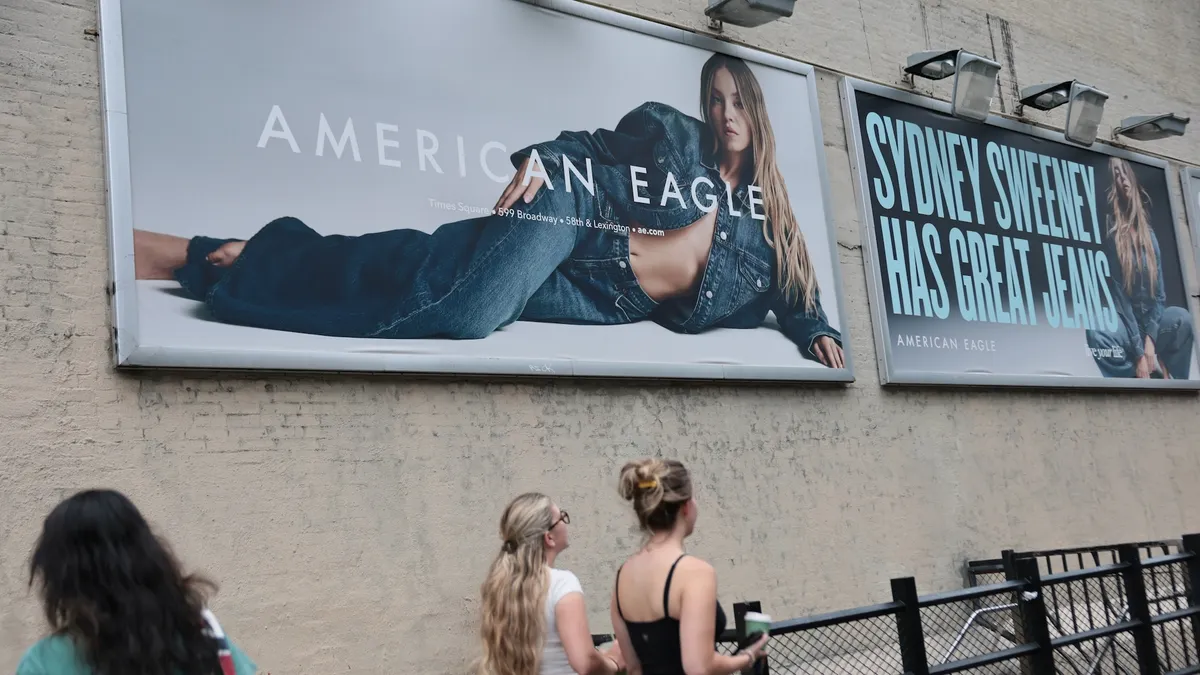With the success of online video as an advertising medium, marketers looking to attract eyeballs and earned media often resort to what’s becoming known as “prankvertising”—playing tricks on the public in order to create a new viral sensation.
Among the most popular in recent years include LG’s hidden-camera prank featuring an end-of-the-world job interview for the “So Real It’s Scary” campaign, and a “Devil Baby Attacks” prank promoting 20th Century Fox’ Devil’s Due that attracted far more views than the movie itself.
But retail brands are getting in on the pranking, too. And although many are treating the shopping public to a trick on April Fools' Day, other retailers are practicing this form of advertising all year round.
Thinning out the jean pool
Just ahead of the holiday in 2013, American Eagle Outfitters claimed to debut a new line of “Skinny Skinny” jeans that “fit like a second skin.” When the company released a commercial and a behind-the-scenes video showing the jeans were painted on, it became clear that the company was having a bit of fun at hipsters’ expense.
The videos were executed by CollegeHumor, which regularly asks its stable of comedy writers to brainstorm branded content for advertisers. “The audience is responding; these videos are really viral,” CollegeHumor CEO Paul Greenberg told Adweek.
Even after the joke was revealed on the Today Show, hundreds of customers attempted to buy the only jeans to outdo jeggings at American Eagle’s website on April Fools’ Day. American Eagle rewarded their gullibility with $10 gift cards.
Going to the dogs
American Eagle doubled down on its burgeoning April Fools’ tradition last year. The company announced a new line of canine clothing under the “American Beagle Outfitters” brand a week ahead of April 1, promising those who signed up for a sneak preview 20% off their next purchase, with $1.00 from each purchase going to the American Society for the Prevention of Cruelty to Animals (ASPCA).
A behind-the-scenes video (no longer available online) showed dogs at American Eagle’s company headquarters and their owners lamenting the sorry state of canine couture. A Today Show segment followed featuring a variety of fashionable Fidos, helping drive the buzz.
In spite of speculation that the line was indeed part of another prank, overwhelming consumer response led American Eagle to go into production on a limited-edition line of canine clothing. The brand ultimately donated $100,000 to the ASPCA.
“We originally felt that April Fools’ Day was the perfect opportunity for us to engage with our consumers in a fun, lighthearted way, all while supporting the ASPCA,” said American Eagle CMO Michael Leedy in a statement. “Due to the tremendous positive response and excitement from our customers for the American Beagle Outfitters line, we decided to make a limited-edition collection for Holiday 2014.”
The masters of virality
Last month, IKEA—known for cheeky creative such as the “Book Book” and “Everyday Heroes” ads—joined the prankvertising fray with a European ad that sends up art-world snobbery.
Digital production company Lifehunters created the prank video, which places a piece of mass-produced IKEA wall décor inside the Modern Art Museum in Arnhem, Netherlands. Experts examine the Nevercrew print, offering their critiques and auction estimates of up to E2.5 million ($2.7 million) for the piece, which retails at IKEA’s U.S stores for $14.99.
“We wanted to prove, with Ikea, that Ikea makes art accessible for everyone,” Erik Hensel, executive producer of the hidden-camera stunt, told PRI. “But we still thought it was a good joke.”
The hits keep coming
Prank ads won’t disappear any time soon. During the holiday season, toy retailer Toys 'R' Us launched a hidden-camera ad in which a busload of children is surprised and delighted when their field trip turns out to be to a Toys 'R' Us store.
Brands are even punking themselves for publicity. During the 2014 Super Bowl broadcast, J.C. Penney marketers issued numerous misspelled tweets in order to promote mittens.
Who kkmew theis was ghiong tob e a baweball ghamle. #lowsscorinh 5_0
— JCPenney (@jcpenney) February 2, 2014
A couple of weeks later, deals site Groupon pretended to get its history wrong by honoring Alexander Hamilton on Presidents Day with a $10 off special, though Hamilton was never president.
“We like to see each other’s lives and foibles and accidents,” Edward Boches, a professor of advertising at Boston University, told Time magazine. Pranks are “an inexpensive way to do something that could generate both attention, visibility online and also some press coverage. As long as consumers laugh about them and pass them on and share them on Facebook, they’ll continue.”






















